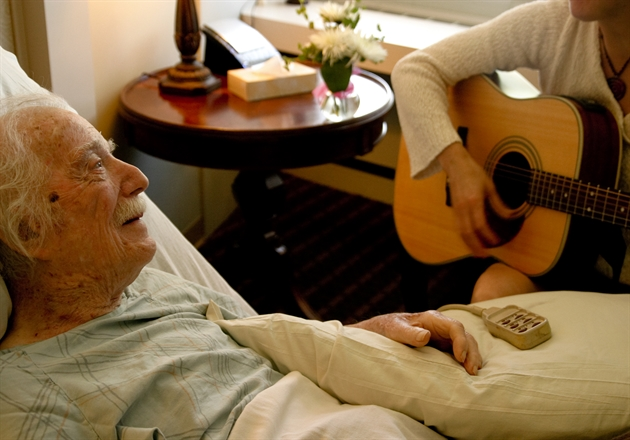The palliative care musical “Night Side Songs” captures the profound complexities of living with a terminal illness through its rich narrative and emotional depth. Unlike traditional musicals, this poignant theatrical performance navigates the sensitive topic of death, providing audiences with a reflective space to engage in conversations about dying and the experiences of patients, caregivers, and clinicians alike. Inspired by the thoughts of cultural critic Susan Sontag, the production emphasizes the humanity behind illness, making it a groundbreaking piece in the realm of theatrical performances on illness. With the involvement of palliative care specialist Susan Block, the musical effectively portrays the reality of end-of-life care, leaving a lasting impact on those who witness it. “Night Side Songs” is not simply entertainment; it’s an invitation to understand and confront the challenges of navigating mortality, encouraging dialogue and empathy surrounding these often-taboo subjects.
Exploring the theme of terminal illness through the lens of art, the musical “Night Side Songs” offers a unique approach to the typically somber matter of dying. This stage production delves into the universal struggles faced by individuals coping with serious health conditions and their families, creating a space for meaningful reflection on the topic of mortality. With its heartfelt storytelling, it stands out as a compelling theatrical experience that promotes healing conversations about life’s final chapter. The integration of music and personal narratives allows the audience to connect deeply with the emotions of the characters, fostering a shared understanding of the delicate realities of life and death. In essence, this innovative musical serves as a powerful vehicle for expressing the often unspoken thoughts and feelings that surround the journey through illness and the inevitability of death.
The Role of Palliative Care in Theater
Palliative care has increasingly become a vital part of the medical landscape, especially for patients facing life-limiting illnesses. Not only does it address physical symptoms, but it also plays a significant role in emotional and spiritual support for patients and their families. The integration of palliative care principles into theatrical performances, such as ‘Night Side Songs,’ provides a unique opportunity to explore the complexities of dying through artistic expression. This approach can foster a deeper understanding of the nuanced experiences associated with terminal illness and create spaces for open dialogue about these often-taboo topics.
The use of theater as a medium for discussing palliative care allows audiences to engage with the realities of illness in a compassionate and thought-provoking manner. The themes presented in ‘Night Side Songs’ reflect the true challenges faced by both patients and caregivers, bridging the gap between clinical environments and the broader community. By infusing emotional authenticity into their performances, artists can invoke empathy and understanding, prompting audiences to consider their own relationships with illness and death.
Exploring Conversations About Dying
Conversations about dying are essential aspects of palliative care that can be deeply beneficial for both patients and their loved ones. In many cases, individuals may grapple with fear and uncertainty as they face the end of life, feeling isolated from their support systems. ‘Night Side Songs’ beautifully encapsulates the importance of these conversations, shedding light on the emotional burden often carried by those affected by serious illnesses. The musical opens pathways for dialogue, encouraging audiences to reflect on their own experiences and perhaps have those difficult conversations with friends and family.
Facilitating open discussions about mortality can lead to strengthened relationships among individuals navigating life-threatening conditions. In ‘Night Side Songs,’ the characters portray the deeply human side of illness, allowing viewers to empathize with their struggles and triumphs. As Susan Block emphasizes, the ability to voice concerns and fears not only alleviates feelings of isolation but also fosters connection. By portraying these intimate interactions on stage, the musical inspires a broader understanding of the need for candid conversations about dying, thereby extending its impact beyond the theater.
The Emotional Impact of ‘Night Side Songs’
The emotional depth of ‘Night Side Songs’ resonates with audiences far beyond a typical theatrical experience. The creative team’s commitment to accurately representing the cancer journey showcases the reality of living with a severe illness. This alignment with the core principles of palliative care ensures that the performance remains relevant to those who have been touched by cancer, offering a space for collective healing and reflection. As viewers witness the struggles and joys of characters like Yasmine, they are invited to navigate their emotions in a supportive environment.
Moreover, the interactivity of the musical enhances its emotional impact; as audiences sing along, they are drawn into a communal experience that reinforces the themes of connection and support. This unique format aligns with palliative care’s focus on relational dynamics, emphasizing the importance of companionship in confronting illness. Susan Block’s involvement highlights the authenticity of the representation, ensuring that the artistic portrayal conveys genuine feelings and experiences related to terminal illnesses. This intersection of art and healthcare ultimately contributes to a more compassionate approach to understanding death and dying.
Incorporating Music into Conversations about Illness
Music has long been recognized as a powerful tool for expressing complex emotions, especially in contexts involving illness and grief. ‘Night Side Songs’ leverages this potential by weaving music into its narrative, allowing audiences to process their feelings through song. The musicality of the performance not only engages the audience but also offers a therapeutic bridge for discussing sensitive topics related to palliative care. The act of singing together can evoke feelings of solidarity and resilience, reminding individuals that they are not alone in their struggles.
As audiences listen to the poignant lyrics and melodies of ‘Night Side Songs,’ they are encouraged to reflect on their own experiences with illness and loss. This shared music experience creates a communal atmosphere that breaks down barriers and promotes understanding. By integrating music into theater, the creators of ‘Night Side Songs’ enhance the overarching thematic exploration of death and dying, illustrating how art can play an essential role in tackling difficult subjects. Ultimately, this approach underscores the necessity of open discussions around serious illness, creating a platform for healing and empathy.
Audience Engagement with Palliative Themes
Engaging audiences with themes of palliative care through theater challenges traditional perceptions of illness and death. Productions like ‘Night Side Songs’ invite viewers to delve into the emotional realities surrounding terminal conditions, making these subjects more approachable. The intimate setting enhances audience interaction, allowing for a shared experience that promotes dialogue about palliative care issues. Artistic Director Diane Paulus advocates for this immersive approach, arguing that it enables the audience to feel a deeper connection not only to the performance but also to each other.
By immersing audiences in the experience of characters confronting illness, ‘Night Side Songs’ stimulates conversations that many might otherwise avoid. In doing so, it normalizes discussions about palliative care and the emotional complexities associated with dying. As viewers engage with the content, they may recognize their own fears and misconceptions about death, leading to a greater acceptance of the reality of mortality. This innovative approach to storytelling underscores the potential of theater to pave the way for understanding and compassion, ultimately enriching societal conversations surrounding end-of-life care.
The Influence of Personal Experience in Musical Creation
The personal experiences of the creators of ‘Night Side Songs’ significantly shaped the narrative and emotional depth of the musical. Daniel and Patrick Lazour’s commitment to authenticity stems from extensive research into end-of-life care and personal reflections on loss. By collaborating with experts like Susan Block, they ensured that the portrayal of palliative care was not only informed but also respectful of the complexities involved. This collaboration highlights the importance of drawing on lived experiences when creating art that aims to discuss sensitive subjects like death.
As the narrative unfolds through various perspectives, from patients to caregivers, the Lazour brothers masterfully weave together a tapestry of human emotion and insight. This multifaceted approach provides the audience with a more comprehensive understanding of what facing terminal illness truly entails. The creators’ dedication to capturing the genuine aspects of palliative care asserts that art can be a powerful medium for empathy, allowing individuals to reflect on their own lives and relationships with those facing serious illness.
Challenging Stigmas Around Death
‘Night Side Songs’ serves as a pivotal tool for challenging societal stigmas surrounding death and dying. By presenting the subject matter through the lens of a musical, it invites audiences to reconsider their discomfort with discussions about mortality. Susan Block’s insights into the dynamics of palliative care highlight the need for broader acceptance and understanding of death, emphasizing that these conversations can lead to healing rather than distress. The musical format disarms audiences, creating a space for exploration rather than avoidance.
Through its engaging narrative and relatable characters, ‘Night Side Songs’ encourages viewers to confront their own fears about dying and the healthcare system. This can empower individuals to advocate for their needs and desires as they face serious illness. By tackling the stigma surrounding palliative care and dying, the musical cultivates a culture of openness, making it easier for families and patients to engage in meaningful dialogues about their experiences, fears, and hopes.
The Future of Palliative Care in Performance Art
As ‘Night Side Songs’ paves the way for a new approach to discussing serious illness through musical theater, it raises critical questions about the future of palliative care representations in performance art. The success of this production could inspire other artists and playwrights to explore similar themes, utilizing the power of storytelling to challenge societal norms. By creating more platforms for these crucial conversations, theater can become a catalyst for change, promoting greater awareness and understanding of palliative care.
Incorporating palliative care themes into performance art can not only educate audiences but can also eradicate misconceptions about death and dying. As future musicals and plays emerge, they may further empower communities to openly discuss the realities of serious illness. Engaging with art that centers around palliative care reinforces its significance in society, encouraging a cultural shift towards a more compassionate and supportive environment for those navigating the journey of life-threatening conditions.
Frequently Asked Questions
What is ‘Night Side Songs’ and how does it relate to palliative care?
‘Night Side Songs’ is a musical that explores the profound themes of illness and death, specifically focusing on the experiences of a young cancer patient. Developed with the guidance of palliative care specialist Susan Block, the musical reflects the emotional journeys of patients, caregivers, and health professionals, emphasizing the importance of discussions surrounding palliative care and end-of-life issues.
How does ‘Night Side Songs’ address conversations about dying?
The musical ‘Night Side Songs’ invites audiences into candid conversations about dying by depicting the realities faced by patients and their families. By using music and theatrical performance, it tackles subjects that are often avoided, fostering a deeper understanding of the dying process and the value of open dialogue about palliative care.
Who are the creators involved in ‘Night Side Songs’ and what is their connection to palliative care?
‘Night Side Songs’ was created by Daniel and Patrick Lazour, who collaborated closely with Susan Block, a renowned palliative care expert. Block’s insights were integral in shaping the musical, as she provided feedback on the characters’ experiences and the emotional truths of their illness journeys, ensuring authenticity in the portrayal of palliative care.
Can ‘Night Side Songs’ be considered a musical about death or illness?
Yes, ‘Night Side Songs’ is indeed a musical about death and illness, focusing on the nuances of living with cancer and the emotional landscape surrounding it. The show prepares audiences for a reflective engagement with themes of mortality, loss, and the role of palliative care in supporting both patients and their families.
What impact does ‘Night Side Songs’ hope to have on audiences regarding palliative care?
‘Night Side Songs’ aims to resonate deeply with audiences affected by serious illness, encouraging them to reflect on their fears and hopes around death and dying. By fostering an engaging atmosphere that allows for audience participation, the musical hopes to normalize conversations about palliative care, thereby reducing the stigma surrounding discussions of mortality.
How did Susan Block’s expertise influence the production of ‘Night Side Songs’?
Susan Block’s expertise in palliative care profoundly influenced the production of ‘Night Side Songs.’ Her consultations ensured that the musical authentically represented the experiences of dying patients and their families, incorporating key aspects of emotional and psychological care, and enhancing the richness of the narrative.
Where can I see ‘Night Side Songs’ and when does it run?
‘Night Side Songs’ is currently being performed at the Cambridge Masonic Temple until April 20, and later at Hibernian Hall in Roxbury. For more information about the show and ticket availability, individuals can visit the A.R.T. website.
What unique theatrical elements does ‘Night Side Songs’ incorporate?
‘Night Side Songs’ offers a unique theatrical experience by utilizing intimate venues with theater-in-the-round settings, encouraging close engagement between the actors and audience. Additionally, the musical invites audience participation through sing-alongs, creating a communal atmosphere that enhances the exploration of palliative care themes.
What critical themes does ‘Night Side Songs’ explore regarding end-of-life care?
The musical explores critical themes related to end-of-life care, including the emotional struggles of patients and their families, the need for open communication about illness, the psychological complexities of dying, and the vital role of palliative care in managing these experiences compassionately.
| Key Points |
|---|
| Palliative care specialist Susan Block advised on the musical ‘Night Side Songs,’ which represents a new approach to discussing end-of-life issues through theater. |
| The musical centers on a cancer patient named Yasmine, showcasing the perspectives of doctors, patients, and families. |
| Block initially had reservations about a musical addressing death but was moved by the rehearsal experience. |
| The production encourages a community dialogue about death and dying, which is often avoided in society. |
| Audiences are invited to sing along, creating a more intimate and engaging experience. |
| ‘Night Side Songs’ reflects current understanding and empathy towards the emotional aspects of dying. |
Summary
Palliative care musical ‘Night Side Songs’ offers a poignant exploration of life, death, and the emotional complexities surrounding terminal illness. This innovative musical, guided by the expertise of Susan Block, invites audiences to engage in candid conversations about mortality while experiencing an intimate theatrical performance. Through compelling storytelling and participatory singing, ‘Night Side Songs’ breaks down barriers, allowing for collective reflection on the realities of serious illness and the human experience.



